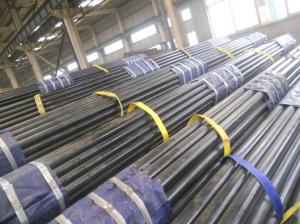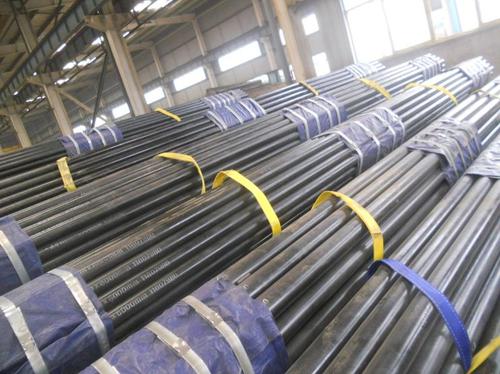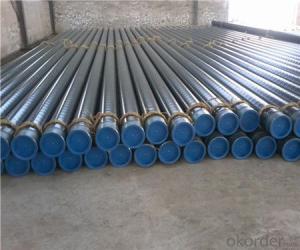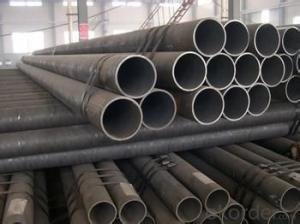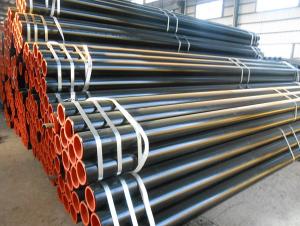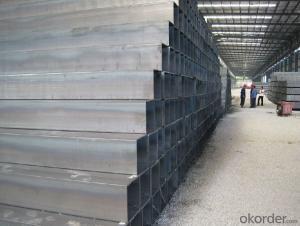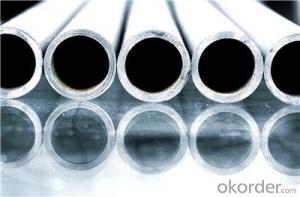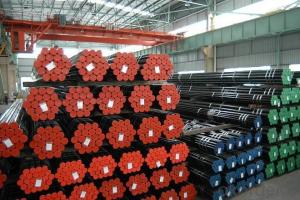High quality API 5L GR.B Seamless Steel Pipe
- Loading Port:
- Tianjin
- Payment Terms:
- TT or LC
- Min Order Qty:
- 30 m.t.
- Supply Capability:
- 5000 m.t./month
OKorder Service Pledge
OKorder Financial Service
You Might Also Like
1、Structure of Seamless Pipe:
Seamless pipe is made with steel bar by perforating machine. It holds a hollow section and there is no seam around. Resulting from the facture process, seamless pipes are of better pressure resistance than other molds, and was usually more easily available and safe than other pipes. We are factory and definitely will satisfy your demand.
2、Main Features of the Seamless Pipe:
• High working accuracy
• High strength
• Small inertia resistance
• Strong therming dissipine ability
• Good appearance
• Reasonble price
3、Seamless Pipe Specification:
Standard | GB, DIN, ASTM ASTM A106-2006, ASTM A53-2007 |
Grade | 10#-45#, 16Mn 10#, 20#, 45#, 16Mn |
Thickness | 8 - 33 mm |
Section Shape | Round |
Outer Diameter | 133 - 219 mm |
Place of Origin | Shandong, China (Mainland) |
Secondary Or Not | Non-secondary |
Application | Hydraulic Pipe |
Technique | Cold Drawn |
Certification | API |
Surface Treatment | factory state or painted black |
Special Pipe | API Pipe |
Alloy Or Not | Non-alloy |
Length | 5-12M |
Outer Diameter | 21.3-610mm |
Grade | 20#, 45#, Q345, API J55, API K55, API L80, API N80, API P110, A53B |
Standard | ASME, ASTM |
1) Material:20#(ASTM A 106/A53 GRB.API5LGRB,GB),45#,16Mn,10#.
2) Specification range: OD: 21.3-610mm, WT:6-70mm, length:6-12m or according to the requirement of clients.
3) Executive standards: GB, ASME API5L.ASTM A 106/A53,Despite of the above standards, we can also supply seamless steel pipe with standard of DIN, JIS, and so on, and also develop new products according to the requirements of our clients!
4) Surface: black lacquered, varnish coating or galvanized.
5) Ends: Beveled or square cut, plastic capped, painted.
6) Packing: bundles wrapped with strong steel strip, seaworthy packing.
4、Packaging & Delivery
Packaging Details: | seaworthy package, bundles wrapped with strong steel strip |
Delivery Detail: | 15-30days after received 30%TT |
5、FAQ of Seamless Pipe:
①How is the quality of your products?
We test on every pipe before delivery. You can get any quality certification or testing report from us. Our products are strictly in accordance with international standard. If products’ quality don’t accord to discription as we give or the promise before you place order, we promise 100% refund.
②How about the price?
Yes, we are factory and offering you the lowest price in the market. Speed and honesty are our target. No hesitate. if you like bargain and factory price is not low enough as you think, just don’t waste your time.Please trust the quotation we would give you, it is professional one.
③Why should you choose us?
Think of our quality and price. They are charming. SGS test / Customer inspection / Third party inspection is OK. We are factory. So we can make any pipe you need in accordance to your requirement. That's attaracting, right?
6、Seamless Pipe Images:

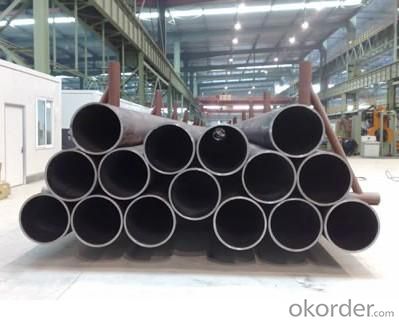
- Q: What are the standard dimensions for steel pipes?
- The standard dimensions for steel pipes vary depending on the application and industry. However, common sizes range from ½ inch to 48 inches in diameter and have various wall thicknesses based on the required strength and pressure rating.
- Q: How are steel pipes used in the manufacturing of power plants?
- Steel pipes are commonly used in the manufacturing of power plants for various purposes such as transporting fluids, gases, and steam. They are utilized for the construction of pipelines that carry water, fuel, and coolant to different parts of the power plant. Additionally, steel pipes are employed in the creation of boiler tubes and heat exchangers, which play a crucial role in the generation of steam and transfer of heat in power plants.
- Q: What are the different types of steel pipe connections for oil and gas pipelines?
- There are several different types of steel pipe connections used for oil and gas pipelines, including threaded connections, welded connections, flanged connections, and grooved connections. Each type has its own advantages and is selected based on factors such as the size of the pipeline, the pressure and temperature requirements, and the specific application.
- Q: Seamless steel pipe is how to do it?
- 1. seamless steel tubes for structural purposes (GB/T8162-1999) are seamless steel tubes for general structural and mechanical construction.2. seamless steel pipe for fluid transportation (GB/T8163-1999) is used to transport water, oil, gas and other fluids of general seamless steel pipe.3. seamless steel tubes for low and medium pressure boiler (GB3087-1999) is used in the manufacture of various structures of low and medium pressure boiler superheated steam pipe, superheated steam pipe, boiling water pipe and boiler flue tube, pipe and brick arch tubes of high quality carbon steel hot rolling and cold drawing (rolling) seamless steel tube.4. high pressure boiler seamless steel tube (GB5310-1995) is used for the manufacture of high-pressure and above the pressure of water boiler heating surface for high-quality carbon steel, alloy steel and stainless steel heat-resistant seamless steel pipe.5. high pressure seamless steel tube (GB6479-2000) for chemical fertilizer equipment is a kind of high quality carbon structural steel and alloy steel seamless pipe for chemical equipment and pipes of working temperature of -40~400 DEG C and working pressure of 10~30Ma.6. seamless steel tubes for petroleum cracking (GB9948-88) are tubes, heat exchangers and seamless steel tubes used in refineries.
- Q: Will the steel tube dance?
- The steel tube dance tube has a rotating steel tube and a fixed steel tube, so that different types of steel pipe can be chosen according to the type of pipe dance performed by the dancer.
- Q: Can steel pipes be used for automotive applications?
- Yes, steel pipes can be used for automotive applications. Steel pipes are commonly used for various automotive components such as exhaust systems, fuel lines, and structural frames due to their high strength, durability, and resistance to corrosion. They provide reliable performance and are cost-effective in automotive manufacturing.
- Q: How do you calculate the stress in a steel pipe?
- To calculate the stress in a steel pipe, you need to consider the material properties of the steel and the external forces acting on the pipe. The stress in a pipe is typically calculated using the formula: Stress = Force / Area First, you need to determine the force acting on the pipe. This could be due to external loads such as pressure, weight, or mechanical forces. You can calculate the force by multiplying the pressure or weight by the surface area on which it acts. For example, if the pipe is subjected to an internal pressure, you can calculate the force using the formula: Force = Pressure x Area Next, you need to determine the cross-sectional area of the pipe. The cross-sectional area of a circular pipe can be calculated using the formula: Area = π x (Diameter / 2)^2 Once you have determined the force and the area, you can calculate the stress by dividing the force by the area. This will give you the stress value in units such as pounds per square inch (psi) or newtons per square meter (Pa). It is important to note that the stress calculation assumes that the pipe is in a state of equilibrium and that the material properties of the steel are known. The material properties, such as yield strength and ultimate tensile strength, are used to ensure that the stress calculated does not exceed the maximum capacity of the steel.
- Q: Can steel pipes be used for underground compressed air pipelines?
- Yes, steel pipes can be used for underground compressed air pipelines. Steel pipes are commonly used for underground pipelines due to their strength and durability. They have the ability to withstand high pressure and can resist corrosion and other environmental factors. Steel pipes are also known for their long lifespan, making them a reliable choice for compressed air pipelines. However, it is important to ensure that the steel pipes are properly coated and protected to prevent any potential corrosion issues. Additionally, proper installation and maintenance of the pipelines are crucial to ensure their efficiency and safety.
- Q: Are there specifications for scaffold steel pipe with 48mm * 3.2mm?
- Previously used steel pipe GB 51*3.0mm, the latest national standard JGJ130-2001 stipulates that the use of steel pipe for construction projects need to be 48*3.5mm specifications, the wall thickness should be 3.5mm square for qualified products.
- Q: Can steel pipes be used for conveying solid materials?
- Yes, steel pipes can be used for conveying solid materials. Steel pipes are known for their durability and strength, making them suitable for transporting various solid materials such as ores, grains, coal, and construction materials. The smooth interior of steel pipes allows for efficient flow and minimal friction, making them a preferred choice in industries like mining, agriculture, and construction.
Send your message to us
High quality API 5L GR.B Seamless Steel Pipe
- Loading Port:
- Tianjin
- Payment Terms:
- TT or LC
- Min Order Qty:
- 30 m.t.
- Supply Capability:
- 5000 m.t./month
OKorder Service Pledge
OKorder Financial Service
Similar products
Hot products
Hot Searches
Related keywords
